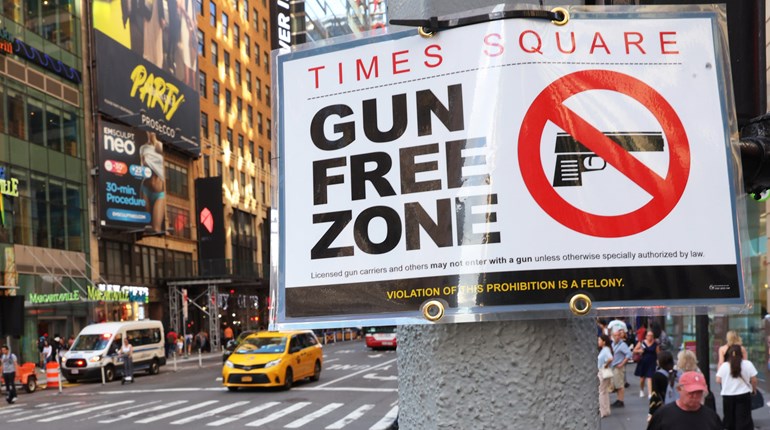
Reports that the Centers for Disease Control and Prevention (CDC) had been caught red-handed deleting defensive-gun-use statistics from its website at the request of anti-gun “partners” have led to congressional action.
This story was broken by Stephen Gutowski at The Reload. Thanks to a Freedom of Information Act request (FOIA), he received a series of emails showing that three gun-control activists worked closely with CDC officials to remove references to criminologist Gary Kleck’s important 1992 study that showed Americans use firearms for self-defense up to 2.5 million times a year.
Apparently, the 2.5 million figure was the sticking point, as it makes it more difficult for gun-control activists to argue the inaccurate claim that guns are seldom used for self-defense. Mark Bryant, head of the Gun Violence Archive, and two others sought the removal of that figure from the CDC website.
“That 2.5 million number needs to be killed, buried, dug up, killed again and buried again,” Bryant wrote in an email to CDC officials after their in-person meeting. “It is highly misleading, is used out of context and I honestly believe it has zero value—even as an outlier point in honest DGU discussions.”
After originally sticking to their guns and refusing to remove the statistics, CDC staffers later acquiesced to the anti-gunners’ requests, according to the released emails.
“We are planning to update the fact sheet in early 2022 after the release of some new data,” Beth Reimels, associate director for Policy, Partnerships and Strategic Communication at the CDC’s Division of Violence Prevention, wrote in a later email. “We will also make some edits to the content we discussed that I think will address the concerns you and other partners have raised.”

The revelation that CDC had removed the statistics didn’t sit well with some lawmakers. In late December, five Republican U.S. Senators—Sen. Chuck Grassley (Iowa), Sen. Tom Cotton (Ark.), Sen. Marsha Blackburn (Tenn.), Sen. Joni Ernst (Iowa) and Sen. Bill Cassidy (La.)—sent a pointed letter to CDC Director Rochelle Walensky demanding answers.
“We write with growing concern and disappointment at the revelation the Centers for Disease Control and Prevention (CDC) succumbed to pressure from gun control organizations to delete references to a commissioned study from the CDC’s website that detailed defensive gun use (DGU) estimates,” the senators wrote. “The CDC prides itself on being a ‘science-based, data driven service that protects the public’s health.’ However, censorship action taken by the CDC has the exact opposite effect of that goal.”
The senators were particularly critical that the information had been removed for political purposes rather than scientific ones.
“The removal of the referenced study was not due to updated research,” the senators wrote. “Instead, based on the released emails from the FOIA request, the removal of this study appears only to have been done to appease gun control groups and to suppress any data that firearms are, in fact, an essential lifesaving and protection tool.”
The senators concluded the letter by calling the DGU data removal a “dereliction of duty” by the CDC and posing a number of questions to the director, including, “Which CDC employees approved the removal of defensive gun statistics from the CDC website? Was the White House consulted?” Another question asked, “Did the CDC engage with any pro-Second Amendment organizations before they authorized the removal of these statistics?”
For his part, Kleck, professor emeritus at Florida State University’s College of Criminology and Criminal Justice, said the CDC did not contact him before removing the figure.
“CDC is just aligning itself with the gun-control advocacy groups,” Kleck told The Reload. “It’s just saying, ‘We are their tool, and we will do their bidding.’ And that’s not what a government agency should do.”
The most-recent data, from the 2021 National Firearms Survey, estimated 1.67 million defensive gun uses annually.
When asked for a response by this magazine, Nick Spinelli, an employee with the CDC News Media Branch, said, “The wide variability in the defensive gun use numbers from multiple sources indicated a very wide range of 60,000 to 2.5 million times per year based on reports from the 1990s. CDC determined that such a wide range is not easily understandable and may be outdated. CDC removed both numbers—the low and high estimates—from a fact sheet and acknowledged that additional research is necessary to understand defensive gun use prevalence, frequency, circumstances and outcomes.”
So the CDC's response is that, to get an average, the high and low numbers should be ignored?
Unfortunately, this isn’t the first time that the CDC has suppressed numbers on defensive gun usage. As America’s 1st Freedom contributor Dave Kopel reported last year, in the late 1990s, the CDC conducted its own DGU study. The results indicated there are likely more than a million such uses each year; however, the study was never released and was kept secret until, decades later, someone leaked it.
Of course, the actual number of defensive gun uses can only by measured with surveys. The most-recent data from the 2021 National Firearms Survey, conducted under the supervision of Georgetown professor William English, estimated 1.67 million DGUs annually.
The CDC is not the only federal agency that committed such a breach of trust last year. Earlier in 2022, the FBI grossly underreported the number of times armed citizens had stopped mass public shootings.
John Lott, head of the Crime Prevention Research Center, brought that to the attention of Congress when he testified before a House subcommittee. According to Lott, after hiring academics at Texas State University to find news stories about DGU incidents, the FBI reported that armed citizens stopped only 11 of the 252 active-murderer incidents that it identified for 2014-2021. Lott’s group, however, looked at news stories and discovered 360 active-murderer incidents during that time period, with 124—more than one-third—being stopped by armed citizens.
An open discussion, with the best data available, is what fosters healthy policy debates. These attempts by a government agency to control the narrative by eliminating data should not be happening in a free country.

































